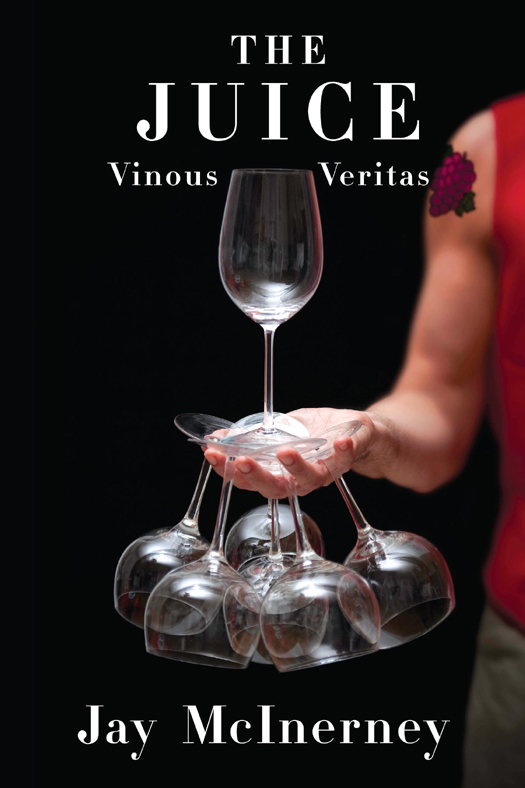
The Juice
Vinous Veritas
کتاب های مرتبط
- اطلاعات
- نقد و بررسی
- دیدگاه کاربران
نقد و بررسی

April 9, 2012
McInerney (A Hedonist in the Cellar) has just the right swagger—a reader of Hemingway, an ’80s slacker reputation earned from his first novel, Bright Lights, Big City, four marriages, sly allusions to Coldplay—to inspire oenological pursuits in a less rarefied, more “like us” crowd. This latest collection of his wine columns from his first gig, House & Garden (before it folded in 2007), and, more recently, the Wall Street Journal, demonstrates a bracing frankness that instills confidence in his vinous choices, such as promoting lower-priced American brands next to Old World masters and his blitheful ability to correct past biases, namely regarding pinot grigio. McInerney is a bit of a name dropper, and one senses he does not bother much about journalistic virtue when visiting vignerons in seductive far-flung locales: Dominique Lafon in Meursault; Ann Colgin in the Napa Valley; Angelo Gaja of Barolo; or the former elBulli’s sensational, changeable chef Ferran Adrià on the hard-to-reach Costa Brava. Still, one of the longest chapters is a sober salute to the innovations of the late Robert Mondavi. Overall, McInerney’s encounters with wines are deeply quirky, thus memorable—his first 1991 Clos Erasmus was a “wonderful hippogriff of a wine... a sort of thinking man’s fruit bomb with lots of structure”—an oenological exegesis entailing a first kiss and lots of personality.

April 1, 2012
Another collection of the acclaimed writer's wine journalism, dominated by short pieces for the Wall Street Journal, some of which seem to have been decanting for too long. Though McInerney has achieved more renown as a novelist (How It Ended, 2009, etc.), many readers and fellow writers might be more envious of his side job, as a wine columnist for House & Garden (where many of the older, longer and more substantial of these pieces appeared) and then for the Wall Street Journal. As someone who admits that he "had a reputation as a party animal; no one had ever accused me of being a connoisseur," he brings plenty of knowledge and experience with wine to the beat, though he's still more interested in the sort of expensive pleasures in which most folks can't afford to indulge than in a consumer-guide approach. "Is any of this relevant to the average wine lover, as opposed to the wealthy collector?" he writes at one point. "I think it is, in several ways. Just as developments in Formula One race cars eventually inform the engineering of the cars the rest of us drive every day, just as haute couture trickles down into the wardrobes of those who have never attended a fashion show"--and so on. "Yes, there's some wine porn here," he confesses, though much of the most interesting writing concerns the people who make wine, those who love it and the places where it flourishes rather than the actual experience of drinking it. The book also chronicles the maturation of the writer's appreciation, from the "flash and flesh" of "big ripe fruit bombs" to more subtle and sophisticated rewards. Much of the material here sounds like it was more fun to research than to write or read.
COPYRIGHT(2012) Kirkus Reviews, ALL RIGHTS RESERVED.

April 15, 2012
Lauded for his fiction, McInerney has recently become even more renowned in the world of fine wines for his impeccable taste and his ability to turn the admittedly subjective art of wine tasting into a more concrete and objective study. He has his own unique likes and dislikes, but McInerney holds uppermost his goal of sharing his rich knowledge with his readers. He may find pinot grigio an overhyped wine, but he recognizes a solidly made version when it's in a glass in front of him. He has always had an affinity for classic Bordeaux vintages, and he clearly relishes visiting the chateaux where the grapes grow and where he meets the artisans who manipulate the fruit into glorious bottlings. But he no less values the great wines of Burgundy, and he appreciates California's and Australia's achievements. McInerney's prose finds felicitous similes and rarely seems forced, unlike so much wine writing.(Reprinted with permission of Booklist, copyright 2012, American Library Association.)

























دیدگاه کاربران